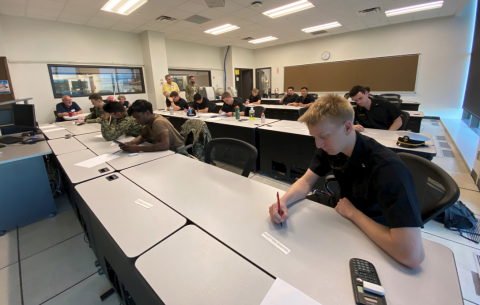AARC and USNA testing

On April 12, 2023, the Anne Arundel Radio Club (W3VPR) administered the Amateur Radio Exam to thirty-five midshipmen and one military instructor during a special testing session at the United States Naval Academy. AARC is a member of the Laurel Amateur Radio Club Volunteer Examiner Coordinator, one of fourteen VECs that serve under the Federal Communications Commission (FCC). The Laurel VEC was established in 1984. Thirty-four of the midshipmen took the Technician Level exam, one midshipman took both the Technician Level and the General Level exams, and one midshipman took the Amateur Extra exam.
Discussions to bring the exam to USNA began in the Fall of 2022, but the real efforts began in February 2023. W3VPR set up a special registration on their website for the midshipmen (https://www.w3vpr.org/NavyPreReg), who were tasked with registering for an FRN and pre-registering for the exam as a homework assignment. Throughout the registration process, W3VPR closely monitored the registration for errors and completion, assisting with incorrect data entry. Additionally, W3VPR recruited six Volunteer Examiners to go to USNA on the day of the exam; with the addition of three VEs on the USNA yard, a total of nine examiners were in place for the exam – three for registration, three for monitoring and three for grading.
Class periods at USNA last 50 minutes, so the testing process was streamlined by W3VPR. AARC prepared and organized all the exams/requisite paperwork beforehand, in alphabetical order by class period. On the day of the exam, W3VPR brought all the exams, answer sheets, extra pencils and calculators, in addition to a standalone computer and printer in case some missing information was quickly needed. On their side, USNA set up seating in the classroom in alphabetical order, in addition to a separate registration table and grading table
The Amateur Radio exam is a new requirement for second-class midshipmen in the Astronautical Track of the Aerospace Engineering major, and was incorporated into EA367: Spacecraft Communication and Power, in which they study satellite communications and power fundamentals with emphasis on analog and digital communications, link and power budget analysis, and power subsystems. Midshipmen in this course have already completed EE331: Electrical Engineering I, in which they study DC and AC electrical elements, circuit and machines, as well as active and passive electronic components and power regulation. To fill in knowledge gaps, a weeklong boot camp of amateur radio course material was incorporated into EA367, including nightly review questions and mandatory online practice exams.
The Technician Level license is important in satellite communications, as the uplink and downlink frequencies are often in these licensed bands. Midshipmen who receive their Technician license will be able to operate midshipmen-built satellites from the Satellite Missions Operations Center in the Spaces Systems Engineering Lab at USNA.
Christine Maceo
Supervisory Engineer
School of Engineering and Weapons